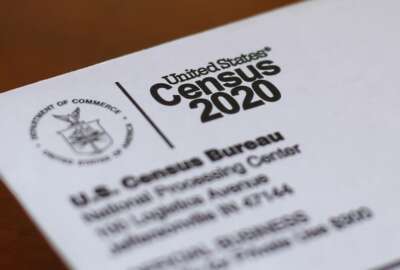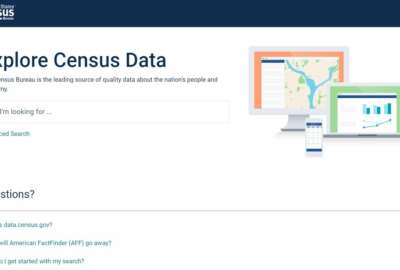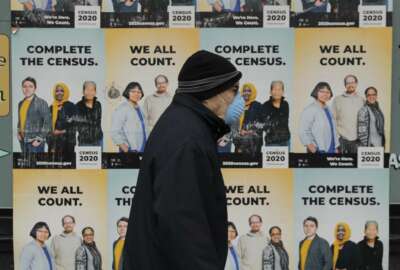
Census Bureau receives ’emergency’ approval to conduct pandemic survey
The Census Bureau’s efforts to get a snapshot of conditions under the pandemic comes a few weeks after calls for Congress to fund a “robust data...
The Census Bureau, already midway through the 2020 population count, is taking on more work in the coming months to gather current data on the disruptions caused by the coronavirus pandemic.
The Office of Information and Regulatory Affairs on Sunday granted “emergency” approval for the bureau to conduct a Household Pulse Survey within the next 90 days to gauge the economic and health impact the pandemic has had on the country.
The bureau’s decision to grab a data snapshot of conditions under the pandemic comes a few weeks after data transparency advocates urged Congress to fund a “robust data infrastructure” as part of the $2 trillion Coronavirus Aid, Relief, and. Economic Security (CARES) Act.
While that call went largely unheeded by Congress, Deputy Census Bureau Director Ron Jarmin told OIRA the bureau is prepared to send the survey out to households as early as this week.
The bureau’s survey will gather data on employment status, consumer spending, food security, housing, education disruptions, as well as physical and mental wellness that will inform how federal, state and local agencies respond to the pandemic in the coming weeks and months.
The bureau will send emails to a sample of households, and possibly through text messages, to fill out the online questionnaire.
The bureau expects to send the survey link to 13.8 million households in total, and receive 108,000 responses each week over the course of 12 weeks.
All told, the bureau expects a 5% response rate.
Conducting the survey this way, the bureau concedes, is “expected to yield response rates much lower than traditional surveys,” but is low-cost and puts a premium on the timeliness of responses.
In a sample email script, Census Bureau Director Steven Dillingham opens by telling the recipient that “many American households are facing significant changes in their financial and economic circumstances.”
“To better understand these experiences, the Census Bureau is inviting you to participate in a Household Pulse Survey,” Dillingham states. “Your answers combined with those of households across the country can guide federal, state and community officials and policymakers in making decisions that support our nation’s communities in their recovery. While your participation is voluntary, it is important.”
The bureau will contact households through its Master Address File, an up-to-date inventory of all known living quarters in the United States.
The database supports the decennial census, the American Community Survey and the bureau’s demographic surveys, and is the “gold standard frame for U.S. statistics,” the bureau states.
Much like the decennial count, individual responses to the pandemic response survey will remain confidential under federal law.
The bureau and other statistical agencies expect to include questions about the pandemic’s impact in other surveys this year, but Jarmin said the rapidly evolving nature of the pandemic required the bureau to “respond to the acute need for data on the situation as it is unfolding now.”
Read more: Data News
“The COVID-19 pandemic is an unanticipated event that is unprecedented in the sudden and dramatic manner in which it is impacting the social and economic well-being of American households,” Jarmin wrote. “At this critical juncture, it is imperative for the federal statistical system to produce real-time, objective data on the impacts on American households as a result of the COVID-19 pandemic.”
The bureau’s questions include the Economic Research Service, Bureau of Labor Statistics, National Center for Health Statistics, National Center for Education Statistics and the Department of Housing and Development.
The Census Bureau has also requested emergency approval from OIRA to conduct a Small Business Pulse Survey that would go out to about a million businesses.
The coronavirus pandemic led the bureau to suspend all in-person interviews for non-decennial surveys, such as the annual American Community Survey, opting instead for all-phone interviews.
More significantly, however, OIRA approved the bureau’s pandemic survey just days after senior White House and Commerce Department officials called on Congress to extend the statutory deadline for the bureau to complete the 2020 count.
Under this new timeline, the bureau would have April 30, 2021 – an extra four months – to submit the final apportionment data file to Congress and the president.
Meanwhile, the bureau would keep decennial hiring and field operations on hold until June 1, and conduct non-response follow-up from Aug. 11 through Oct. 31.
Extending the 2020 census timeline would prevent enumerators from coming into contact with households during the height of the pandemic.
But for this updated timeline to work, Congress would have to pass a bill to push back these statutory deadlines.
Read more: Technology News
More than half of all American households have self-responded to the 2020 census, and households can continue to self-respond online, over the phone or via a paper questionnaire through Oct. 31.
The bureau’s efforts to gather contemporaneous data on the coronavirus’s effects dovetails with the recent launch of a COVID-19 Household Impact Survey led by the Data Foundation.
Data Foundation President Nick Hart said his organization launched its survey “because our government was unable to act quickly enough to capture the early trends of the pandemic.”
However, he added that the bureau’s efforts will align well with the foundation’s work.
“We are pleased that the COVID Impact Survey and the government-led survey will be complimentary and will vastly expand the information available to the American public and our decision-makers,” Hart said Tuesday in a statement.
Copyright © 2025 Federal News Network. All rights reserved. This website is not intended for users located within the European Economic Area.
Jory Heckman is a reporter at Federal News Network covering U.S. Postal Service, IRS, big data and technology issues.
Follow @jheckmanWFED





